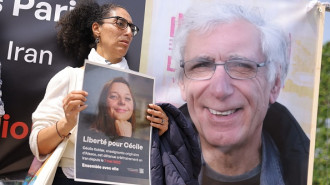Turkey says no violations of ceasefire in Syria's war-ravaged Idlib
"We will continue to be a deterrent force to prevent any violation to the ceasefire. None occurred since ceasefire entered into force," Akar said according to the defence ministry.
The ceasefire was reached earlier this week after talks between Turkish President Recep Tayyip Erdogan and his Russian counterpart Vladimir Putin.
The fresh negotiations came after a period of heightened tensions between Ankara and the Syrian regime, which is backed by Moscow.
Dozens of Turkish and Syrian regime soldiers have been killed over the past month in deadly clashes in Idlib, where Ankara has demanded forces loyal to Bashar al-Assad quit their campaign to reclaim the country's last opposition bastion and retreat from positions near Turkish military observation posts.
Turkey will use its right to self-defence if there is any attack on its forces or bases in the region, Akar said according to Reuters.
The ceasefire deal also calls for joint Russian-Turkish patrols around the key M4 highway in Idlib starting March 15.
Turkey has begun working on procedures to establish a "safety corridor" around the road, Akar added.
US blocks Security Council support for ceasefire
The United States on Friday blocked the adoption of a UN Security Council statement supporting the Idlib ceasefire, diplomats said following a closed-door meeting.
"It's premature," the United States said, rejecting the joint statement which Russia's ambassador to the UN, Vassily Nebenzia, had asked the other 14 member states to adopt, according to diplomats.
|
|
"Various countries took note and welcome the agreement," said Nebenzia. "But due to a position from one delegation, it was not possible."
The ravaged Idlib province woke to relative calm on Friday, the first morning after the ceasefire was put into place.
Its skies were free of warplanes for the first day in months, marking a drastic change from the fierce Russian- and regime-led aerial bombardment that has displaced nearly a million people in three months.
Despite that initial calm, critics of both parties have raised concerns that the ceasefire will not hold.
Indeed, Turkey's presence in the Idlib region was established as part of a past ceasefire deal negotiated with Russia that came to a crashing halt last year when Moscow-backed regime forces launched their campaign to reclaim the territory, which is held by rebel and extremist factions.
"There are a lot of questions about how it will work in practice, who will monitor it, what is happening west of Aleppo and critically has the Syrian government formally signed up?" said British Ambassador Karen Pierce.
Her German counterpart Christoph Heusgen echoed the sentiment, stating: "We have to see if this will work."
"We are concerned about the millions of people who are suffering there and we would [like to] see that this ceasefire leads to a kind of safe zones where people can go back to and they can survive," he added.
According to diplomats, Moscow signaled that it could oppose endorsement of the US-Taliban peace deal in the Security Council following the US opposition to the Russia-Turkey ceasefire.
Only a brief exchange of fire before dawn has marred the ceasefire so far, Rami Abdel Rahman told AFP.
Rahman, chief of the UK-based Syrian Observatory for Human Rights, said six regime fighters and nine members of the Turkistan Islamic Party, a Uighur-led extremist group, has been killed.
Other militants have observed the ceasefire, he added.
Agencies contributed to this report
Follow us on Facebook, Twitter and Instagram to stay connected





 Follow the Middle East's top stories in English at The New Arab on Google News
Follow the Middle East's top stories in English at The New Arab on Google News

![The law could be enforced against teachers without prior notice [Getty]](/sites/default/files/styles/image_330x185/public/2178740715.jpeg?h=a5f2f23a&itok=xMdFOAIF)
